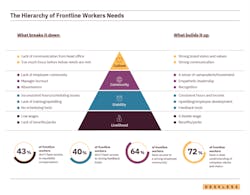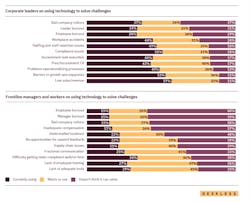Given deskless workers make up 80% of the global workforce, Axonify wanted to uncover what issues workers were facing. Its new study, The Deskless Report, is comprised of interviews with 260 corporate leaders and 1,000 workers and managers across multiple industries.
The report identified a framework for workers needs.
Here’s a look at three key insights from the findings.
Frontline managers are critical but burning out—fast
Managers are expected to be everything to everyone. They link corporate to staff, often relying on outdated or ill-fitting communication systems, lead the implementation of new initiatives with tight timelines and little information, and have to quickly fill gaps that erupt on the frontline due to labor shortages—all while just trying to stay afloat amid everyday challenges.
The research shows that 49% of frontline managers are feeling burned out on a daily basis. As the single source of truth, they are relaying often key information in-person, via text or other messaging systems that aren’t organized, trackable or optimized. This means there’s no way to ensure messages are getting to the right people at the right time, both from corporate to employees and feedback that’s moving in the other direction. This is, at best, an ineffective way to operate and, at worst, detrimental to any culture that claims to prioritize communication.
Leaders need to unburden managers with the right tools to help them perform their jobs effectively, lead their teams with empathy and message important feedback to corporate, who are often unaware of the day-to-day issues facing staff.
Misalignment is leaving fundamental employee needs unmet
Organizations want employees to understand the “why” behind their work but it’s a two-way street. Frontline workers have a “why” too, and without equitable compensation, steady schedules, adequate support or a dependable way to communicate when things aren’t right—all identified as significant happiness drivers for workers—success and satisfaction will continue to stay out of reach. Employees are craving stability, community and empathetic leadership, but what happens when it feels like no one’s listening? The Great Resignation. Quiet Quitting. And whatever the next trend is that puts workers in impossible scenarios that don’t serve them or the business.
Tech enablement needs an upgrade
It’s no secret that technology has the power to transform the workplace and, when done right, it can elevate the frontline associate experience by making the job more efficient, engaging and rewarding.
But when done poorly (such as putting new devices in employees’ hands without setting usage expectations or baselining knowledge, or offering too many disparate systems rather than consolidating), the result is more frustration, poor company culture and wasted investment dollars.
There also needs to be a shift in perception. Leaders should focus on tech as an employee enablement opportunity that can solve some of the most pressing issues—compensation, community, burnout, etc.—and treat it with the same enthusiasm as customer-facing digital initiatives. Up to this point, the digital transformation of the frontline has favored the consumer— who understandably holds purchase power—but the lessons learned should be leveraged to improve the experience for employees and managers alike.
About the Author
EHS Today Staff
EHS Today's editorial staff includes:
Dave Blanchard, Editor-in-Chief: During his career Dave has led the editorial management of many of Endeavor Business Media's best-known brands, including IndustryWeek, EHS Today, Material Handling & Logistics, Logistics Today, Supply Chain Technology News, and Business Finance. In addition, he serves as senior content director of the annual Safety Leadership Conference. With over 30 years of B2B media experience, Dave literally wrote the book on supply chain management, Supply Chain Management Best Practices (John Wiley & Sons, 2021), which has been translated into several languages and is currently in its third edition. He is a frequent speaker and moderator at major trade shows and conferences, and has won numerous awards for writing and editing. He is a voting member of the jury of the Logistics Hall of Fame, and is a graduate of Northern Illinois University.
Adrienne Selko, Senior Editor: In addition to her roles with EHS Today and the Safety Leadership Conference, Adrienne is also a senior editor at IndustryWeek and has written about many topics, with her current focus on workforce development strategies. She is also a senior editor at Material Handling & Logistics. Previously she was in corporate communications at a medical manufacturing company as well as a large regional bank. She is the author of Do I Have to Wear Garlic Around My Neck?, which made the Cleveland Plain Dealer's best sellers list.
Nicole Stempak, Managing Editor: Nicole Stempak is managing editor of EHS Today and conference content manager of the Safety Leadership Conference.


